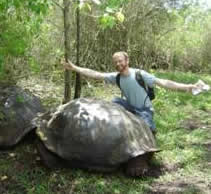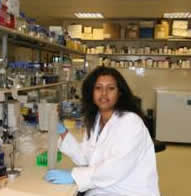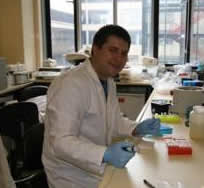
PhD Fellows
These 3-year fellowships have provided postgraduate training in advanced genetic analysis to 9 fellows. PhD fellows have applied the latest genetic approaches to key biological research questions. Training incorporates a high level of analytical skills delivered through duel supervision of the research, together with both specific and generic training to underpin fellows’ future career. The PhD is an internationally recognised qualification.
Arnaud Bataille - Belgium
 Background: BSc, 2002 (University of Liege, Belgium); Postdoctorate Fellowship 2003, Funded by CGRI (Belgium) and the CIMO (Finland)
Background: BSc, 2002 (University of Liege, Belgium); Postdoctorate Fellowship 2003, Funded by CGRI (Belgium) and the CIMO (Finland)
Term of Fellowship: 10/2005 - 09/2008
Project Title: Genetics, parasitology and ecology of mosquito spp.: impact of disease vectors on biodiversity in the Galápagos archipelago.
This programme has given me the opportunity to come to the UK where there is a high quality of study in my research area. It has given me more opportunities than staying in Belgium. Mobility has been very important as I have had the opportunity to go to the Galapagos Islands for my research. It has been possible to go to a lot of conferences and to network with other evolutionary biologists, this has been essential for me as I now know many people in the field.
Current position: I will go for a post-doc or a fellowship probably in the UK and concentrate more on human health related diseases and emerging diseases, potentially the role of bats and emerging viruses in humans.
Publications:
Bataille, A.; Cunningham, A.A.; Cedeño, V.; Patiño, L.; Kramer, L.D.; Goodman, S.J. Natural colonisation and adaptation of a mosquito species in Galápagos: implications for disease threats to endemic wildlife. “ConGen3: the 3rd International Conservation Genetics Symposium”, travel reports, in Genetics Society News of January 2008 (issue 58).
Bataille, A.; Cunningham, A.; Cedeño, V.; Patiño, L.; Constantinou, A.; Kramer, L.D.; Goodman, S.J. Natural colonisation and adaptation of a mosquito species in Galápagos: implications for disease threats to endemic wildlife. PNAS, in press. (2008)
Bataille, A.; Horsburgh, G.J.; Dawson, D.A.; Cunningham, A.A.; Goodman, S.J. Microsatellite markers characterized in the mosquito Aedes taeniorhynchus (Diptera, Culicidae), a disease vector and major pest on the American coast and the Galápagos Islands. Infection, Genetics and Evolution. In press. (2009)
Lutz Breitling - Germany
Background: MD 2004, (University of Tuebingen, Germany)
Term of Fellowship: 10/2005 - 12/2006
Project Title: Genetic epidemiology of hookworm infection.
Lutz applied mathematical and genetic modelling approaches to the question of human disease susceptibility. Following his initial year of training he decided to move into the area of medical statistics and now works as a clinical epidemiologist.
Current Position: Scientist, Division of Clinical Epidemiology and Aging Research, German Cancer Research Center, Germany.
Publications:
Breitling, L.P.; Wilson, A.J.; Raiko, A.; Lagog, M.; Siba, P.; Shaw, M-A.; Quinnell, R.J. Heritability of human hookworm infection in Papua New Guinea. Parasitology, 12:135 (2008) http://journals.cambridge.org//action/displayAbstract?fromPage=online&aid=2485180
Elena Clerici - Italy
 Background: BSc; MSc 2003 (Milan State University, Italy)
Background: BSc; MSc 2003 (Milan State University, Italy)
Term of Fellowship: 10/2005 - 10/2007
Project Title: Studying Wuschel interactions in Arabidopsis thaliana.
Leeds has been a fantastic place to study; the School of Biology has encouraged me to extend my skills in many directions; the University has given me the opportunity to meet people from many different countries, cultures, and backgrounds.The University also offers a large range of clubs and societies to meet people from other disciplines, and it is through the Sub-Aqua club that I have become a very proficient diver and instructor. It is thanks to all this that I met my future husband with whom I had a baby.
During my four years in Leeds I have: spent three years researching stem cells (meristems) in Arabidopsis thaliana. I have discovered that a key transcription factor that maintains the stem cells in their undifferentiated state works, in part, by recruiting members of a small family of transcriptional corepressors. I have identified the protein domains responsible for this recruitment, which surprisingly let me to suggest a mechanism of action for a well characterised repression domain in another class of proteins. From this I have postulated that the new class of transcriptional corepressors interacts with a specific range of plant transcription factors to regulate plant development. I have given presentations both nationally and internationally, and I have travelled as far as Beijing in the course of my studies, this enabled me to discuss my research with people all over the world.
Publications:
Kieffer, M.; Stern, Y.; Cook, H.; Clerici, E.; Maulbetsch, C.; Laux, T.; Davies, B. Analysis of the Transcription Factor WUSCHEL and Its Functional Homologue in Antirrhinum Reveals a Potential Mechanism for Their Roles in Meristem Maintenance Plant Cell 18: 560-73, (2006) http://www.plantcell.org/cgi/content/short/tpc.105.039107v1
Stefanie Jourdan - Germany
Background: BSc; MSc, 2005 (University of Technology, Berlin)
Term of Fellowship: 04/2005 - 03/2008
Project Title: The recognition and cleavage of RNA by the RNaseE family.
During my Marie Curie EST funded PhD I was able to attend an international summer conference in Utah (FASEB meeting) as well as a Wellcome Trust organized advanced course on Functional Genomics and Systems Biology. I also attended a number of national conferences. On these occasions I have been able to meet scientists from within my field of research, which is helpful in establishing networks, and from different research areas which broadened my scientific understanding of a variety of subject’s. During the Wellcome Trust advanced course I was able to gain insight into new analysis techniques. The training courses at Leeds have helped to enhance my broader scientific and generic skills.
Publications:
Bener-Aksam, E.; Koek, A.; Kiel, J.A.K.W.; Jourdan, S.; Veenhuis, M.; And Van der Klei, I.J. A peroxisomal Lon protease and peroxisome degradation by autophagy play key roles in vitality of Hansenula polymorpha cells Autophagy 3, 96-105, (2007) http://www.landesbioscience.com/journals/autophagy/article/3534
Jourdan, S.; McDowall, K. Sensing of 5’ monophosphate by E. coli RNase G can significantly enhance association with RNA and stimulate the decay of functional mRNA transcripts in vivo Molecular Microbiology (2007) http://www3.interscience.wiley.com/journal/119408899/abstract
Kime, L.S.; Jourdan, S.S.; McDowall, K.J. Identifying and characterizing substrates of the Rnase E/G family of enzymes Methods Enzymol. 447.
Irene Lindström - Sweden
Background: BSc; MSc, 2005 (Linkoping University, Sweden)
Term of Fellowship: 09/2005 - 08/2008
Project Title: Characterisation of Toxoplasma gondii genotypes in Uganda.
I have had a great time at Leeds University and really had the opportunity to develop my research skills. I have especially appreciated the many opportunities for collaborations; in Uganda, USA, Sweden and Liverpool, and the many research contacts they have resulted in. The training allowance provided by the AGAPE program has given me the opportunity to participate in several courses and congresses, which is really important in order to acquire a deep and broad knowledge in the field.
Current position: I will go for a postdoc in Sweden, hopefully in the field of parasite genomics.
Publications:
Lindström, I.; Kaddu-Mulindwa, D.H.; Kironde, F.; Lindh, J. Prevalence of latent and reactivated Toxoplasma gondii parasites in HIV-patients from Uganda Acta Trop.100:218-22, (2006) doi:10.1016/j.actatropica.2006.11.002
Lindstrom, I.; Sundar, N.; Lindh, J.; Kironde, F.; Kabasa, J.D.; Kwok, O.C.; Dubey, J.P.; Smith, J.E. Isolation and genotyping of Toxoplasma gondii from Ugandan chickens reveals frequent multiple infections Parasitology, (2007) http://journals.cambridge.org/action/displayAbstract?aid=1586248
Myriam Saida - France
Background: DEUG, 2001 (Franche-Comte University, France); MSc, 2004 (Ecole Superieure de Biotechnologie De Strasbourg, France)
Term of Fellowship: 02/2005 - 01/2008
Project Title: Composition and analysis of spermatozal chromatin.
I have grown a lot during the PhD and become more open-minded about how people work and live. The academic level at University of Leeds is very good and it has been possible to acquire a large variety of scientific experience and knowledge which I may not have gained without the Marie Curie funding.
Current position: I am flexible regarding my career options; I may work in a public health laboratory service or for a private company doing clinical genetic diagnostic research in France.
Anuradha Singh - India
 Background: BSc, 1997 (Bangalore University, India); MSc, 1999 (University of Mysore, India)
Background: BSc, 1997 (Bangalore University, India); MSc, 1999 (University of Mysore, India)
Term of Fellowship: 06/2005 - 05/2008
Project Title: The regulation of epigenetic states by Chromatin components.
The exposure has been the most important element of the Marie Curie grant; I have been able to experience working with people from different backgrounds and make use of funding opportunities. It has been useful to get a feel for research networks in Europe as there isn't such a thing in India and I wouldn't have learnt so much in my discipline. I have been able to help build up an alliance between European and Indian plant centres and was involved in the delegation to develop this link.
Current position: Will be looking for post-docs in Genetics preferably working at Cambridge. Eventually I want to return to India to either work for the industry or start something of my own
Publications:
Singh, A.; Zubko, E.; Meyer, P. Co-operative activity of DNA methyltransferases for maintenance of symmetrical and non-symmetrical cytosine methylation in Arabidopsis thaliana. The Plant Journal, Manuscript No. TPJ-00486-2008.R1, (2008) http://www3.interscience.wiley.com/journal/121356214/abstract
Pedro Soares - Portugal
 Background: BSc; MSc, 2003 (University of Porto, Portugal)
Background: BSc; MSc, 2003 (University of Porto, Portugal)
Term of Fellowship: 05/2005 - 04/2008
Project Title: Complete mitochondrial DNA genomes and phylogeography in island south east Asia.
I have benefitted greatly from this programme. The Marie Curie fellowship has been the most important part of my development. I feel very privileged to have the opportunity to come to the UK and work with Dr Martin Richards. I am close to being top of my field and couldn't be happier in terms of my career.
Current position: One year post-doc sponsored by the British Academy until April 2009. I would like to return to Portugal in the next four years after establishing contacts with archaeologists in the UK.
Publications:
Hill, C.; Soares, P.; Mormina, M.; Macaulay, V.; Meehan, W.; Blackburn, J.; Clarke, D.; Raja, J.M.; Ismail, P.; Bulbeck, D.; Oppenheimer, S.; Richards, M. Phylogeography and ethnogenesis of aboriginal Southeast Asians. Molecular Biology and Evolution 23:2480–2491, (2006) http://mbe.oxfordjournals.org/cgi/content/full/23/12/2480
Soares, P.; Pereira, F.; Brion, M.; Alves, C.; Richards, M.; Carracedo, A.; Amorim, A.; Gusmao, L. Relative Y-STR mutation rates estimated from the variance inside SNP defined lineages. International Congress Series 1288, 82-84, (2006).
![]() doi:10.1016/j.ics.2005.09.173
doi:10.1016/j.ics.2005.09.173
Hill, C.; Soares, P.; Mormina, M.; Macaulay, V.; Clarke, D.; Blumbach, P.B.; Vizuete-Forster, M.; Forster, P.; Bulbeck, D.; Oppenheimer, S.; Richards, M. A mitochondrial stratigraphy for the Indo-Malaysian Archipelago: Testing models of prehistoric dispersals. American Journal of Human Genetics, (2007) doi:10.1086/510412
Soares, P.A.; Trejaut, J.A.; Loo, J.H.; Hill C.; Mormina M.; Lee, C.L.; Chen, Y.M.; Hudjashov, G.; Forster P.; Macaulay, V.; Bulbeck, D.; Oppenheimer, S.; Lin, M.; Richards, M.B. Climate change and postglacial human dispersals in Southeast Asia Molecular Biology and Evolution 25, pp.1209 - 1218, (2008) http://mbe.oxfordjournals.org/cgi/content/full/25/6/1209
Pereira, F.; Soares, P.; Carneiro, J.; Pereira, L.; Richards, M.; Samuels, D.C.; Amorim, A. Evidence for variable selective pressures at a large secondary structure of the human mitochondrial DNA control region. Molecular Biology and Evolution, (2008)
Carmen Taype Perez - Peru
 Background: MD; MSc, 2003 (Universidad Peruana Cayetano Heredia, Peru)
Background: MD; MSc, 2003 (Universidad Peruana Cayetano Heredia, Peru)
Term of Fellowship: 11/2004 - 10/2007
Project Title: Host and pathogen genetics in tuberculosis and leishmaniasis.
I have great memories of Leeds. Being a Marie Curie Fellow has been one of the most important achievements in my career, I have increased my knowledge and acquired new skills in genetic research. It has been possible for me to attend international conferences to present abstracts and I have had the opportunity to go to the Institute of Research and Development (IRD) in France, to learn new skills for the development of my research project. It has been highly stimulating to be part of one of the few groups worldwide concentrating on this area of research and I have learnt a lot. My experience has also allowed me to establish links with UK and EU researchers which will be useful in the future to develop joint research projects in the field of genetics and infectious diseases.
Current position: Internal Medicine resident in USA, then I plan to follow a 3 years fellowship program in Infectious Diseases/Pulmonary and Critical Care Medicine.
Publications:
Taype, C.A.; Castro, J.C.; Accinelli, R.A.; Herrera-Velit, P.; Shaw, M.A.; Espinoza, J.R. Association between SLC11A1 polymorphisms and susceptibility to different clinical forms of tuberculosis in the Peruvian population Infection, Genes and Evolution, 6 361-367, (2006) ![]() doi:10.1016/j.meegid.2006.01.002
doi:10.1016/j.meegid.2006.01.002
